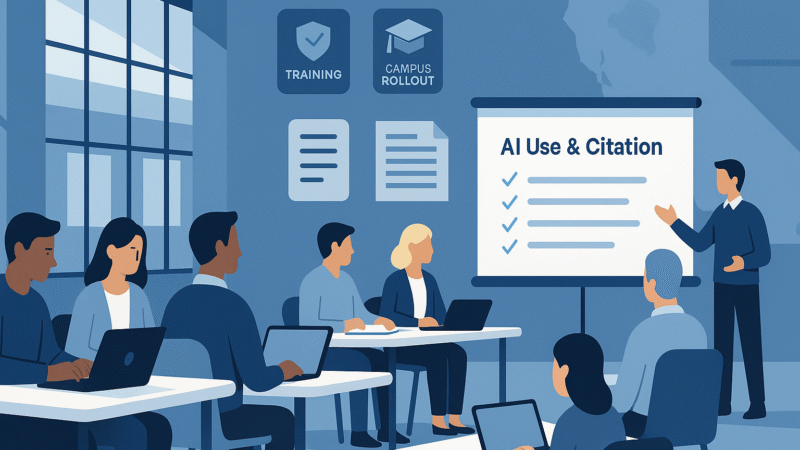As AI moves from pilot projects into everyday tools, real progress depends on faculty capacity. This piece centers instructors co-designing rubrics, syllabus policies, and course workflows—paired with LMS/Workspace integrations and emerging research infrastructure—so platforms amplify learning, integrity, and scholarship rather than replace human judgment.
Tag: AI literacy
AI on campus shifted from trial runs to infrastructure. California institutions get free training from Google and Microsoft, Indiana University enables ChatGPT Edu for 120,000 users, and colleges push for clear rules, disclosure, and data safeguards. Plus Latam-GPT for regional access and Pearson study tools at scale.
Investors, regulators, and educators advanced artificial intelligence across higher education this week—from a billion-dollar push for multilingual degrees to new grant-writing guardrails—showing that real progress pairs bold tools with clear, faculty-led governance.
From India’s cutting-edge AI hub to grassroots tools built by nonprofits, this week’s global headlines reveal a powerful truth: the future of learning isn’t just being automated—it’s being reimagined. Educators, regulators, and innovators across sectors are stepping up to shape AI in ways that serve access, accountability, and impact.
As AI reshapes the landscape of higher education, optimism alone won’t bridge the gap between vision and reality. From data privacy to ethical AI use, institutions face urgent challenges that demand intentional leadership, strategic planning, and bold action. Discover why AI in education needs more than promise—it needs purpose.
This article explores the profound impact of artificial intelligence (AI) on the future of education, emphasizing the shift from traditional teaching methods to more personalized, student-centered approaches. Drawing from insights at The Teaching Professor Conference, the piece highlights how AI is reshaping the educator’s role—from content deliverer to experience designer—and how intentional integration of AI tools can foster creativity, engagement, and mentorship in the classroom. It also delves into the ethical considerations of AI usage in education, stressing the importance of AI literacy, inclusive learning environments, and critical thinking. The article provides practical action steps for educators to leverage AI effectively while maintaining a focus on innovation with purpose. Ultimately, it challenges educators to not only adapt to emerging technologies but to lead them purposefully to revolutionize learning experiences and empower future generations.






